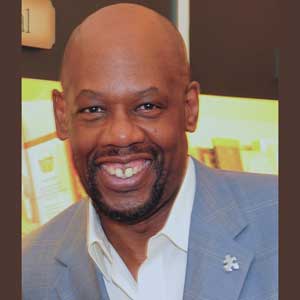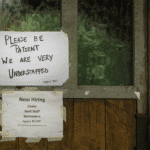The business of parking /
human resources
The Business of Parking /
Human Resources
Crisis, Leadership, Risk-Taking and You

It goes without saying that the period from March 2020 until present day will go down in history as one of the most tumultuous periods of time that we have ever experienced, not just domestically but internationally. There are many reasons for this: a global pandemic, issues of racial inequity, political instability, issues of reform from taxation to criminal justice, education, and healthcare disparities—the list goes on and on. The questions that we are now faced with and will be for some time, I contend, is how we deal with the many crises now in front of us, the challenges they present to the notion of leadership, how we now look at risk-taking, and what role each of us play in this conundrum.
We can look at a crisis from a definitional standpoint as a time of intense difficulty, trouble, or danger where an important decision must be made, and which in the short-term has the distinct possibility of a highly undesirable outcome. This is a workable definition, but I suggest it does not go far enough. As many of us know, when a crisis occurs there is usually a downturn, at least temporarily, in the results that one can expect as a result. Further, since most individuals and organizations typically do not consider that a crisis will occur, or they think if one does occur, they will have the time to react appropriately to it, they do not do a good job of planning ahead for a crisis.
But here is the reality: it is never a question of if a crisis will occur but rather when it will. Also, when a crisis does occur it represents change, which is never easy for people to accept. Change requires that we examine a litany of issues, from internal factors including technical production, political processes, and organizational culture to name a few, as well as external factors involving domestic and foreign competition as well as social and governmental trends among many others.
As we all contemplate how we will develop the resolve and the resilience we need to address the multiplicity of issues we are facing, this should lead us to a natural discussion about leadership and being a leader. In times of crisis like we are experiencing now, there are three things that people look for from their leaders. Before I begin to discuss the components of a leader let me share a word on resilience. Resilience differs significantly from endurance, which is the past standard many used when addressing a crisis. Endurance means you put your head down and push, push, push until you breakthrough the issue. Resilience requires us to keep our head up so that we can see and/or anticipate issues because we are constantly scanning our environment for clues that will help us address situations. Endurance with its head down approach leads to increased stress and burnout. Resilience allows us to stay connected to our environment and provides for new perspectives which are sorely needed at this point in time.
Now let’s move on to discuss leadership and what people need. First, they want tangible leadership in action which they can see and appreciate. Also, it cannot just be visible, but it must also be approachable, or it comes off as aloof. Second, they want leaders they can believe in. Third, they want leaders who appreciate the perspectives of the individuals who are going to be the most vulnerable or threatened because of the crisis and who can build trust with that constituency.
I have mentioned two terms, leadership, and leader, and while many people use them interchangeably, I like to share a distinction I make between the two and ask you to try it on for size. I think for me, leadership is about what you do, and it is the traits we expect people to display when needed. Leadership is the what and when and anybody can do anything once which does not make you successful.
In order to be successful, you have to be able to replicate your actions consistently. A leader on the other hand, for me, is about being who you are most consistently, and it is also about why you pursue the course of action you take. A leader is not in it for the glory—although sometimes a robust recognition of the leader’s actions will result, but that is not the intended goal. Rather, the leader understands and is always willing to put service to others above self. They are perfectly content in knowing that a job done well is better than well said, and it is the best recognition you can receive.
When it comes to dealing with a crisis, a leader can quickly and effectively identify the stakeholders who form a wide spectrum and delineate the appropriate response that is needed to address individual and collective concerns. A leader is one who can and does engage others and provides an opportunity for them to feel a sense of stability amidst the onslaught of the crisis. This is accomplished in no small measure by incorporating one of the most underutilized communication skills: the ability to listen, because they understand that even though decisions must be made, they cannot be made in a vacuum, and if they incorporate multiple perspectives it builds in commitment from those stakeholders they are trying to serve.
This gets me to risk taking which is something that many might want to shy away from given the current situation we face. However, I contend that this is the very time we need to take risks. We need to encourage risk taking because the world has changed so dramatically. There are a few things we can do to encourage risk taking, as follows:
- Ensure the psychological safety of our team members.
- Provide opportunities for them to check-in on how they are doing on a routine basis.
- Let team members know it’s okay not to be okay with the way things are, but also let them know they cannot become paralyzed.
- Focus on process and progress, not perfection.
When you think about operating in a crisis, understanding your role relating to leadership and being the leader you can be, risk taking, and the things you can and should do to address these areas, you should be able to see that there are many things that we have control over, including how we respond to a crisis. The ability to understand the environment in which you operate, the things you want to project to others, and how you value others can and will go a long way in helping you work through any situation.
stock.adobe.com / Andrii Yalanskyi
Julius E. Rhodes, SPHR, is the Founder and Principal of the mpr group and author of BRAND: YOU Personal Branding for Success in Life and Business.
-
Julius E. Rhodes, SPHRhttps://parking-mobility-magazine.org/author/julius-e-rhodes-sphr/December 2, 2021
-
Julius E. Rhodes, SPHRhttps://parking-mobility-magazine.org/author/julius-e-rhodes-sphr/April 11, 2022
-
Julius E. Rhodes, SPHRhttps://parking-mobility-magazine.org/author/julius-e-rhodes-sphr/July 9, 2023

EV Charging Accessibility
A Comprehensive Guide in Ensuring ADA Compliance in Electric Vehicle

From Parking Lot to Destination
How EV Charging Elevates the Role of Parking Facilities

A Year of Proposals
As we fully came out of the pandemic in late








